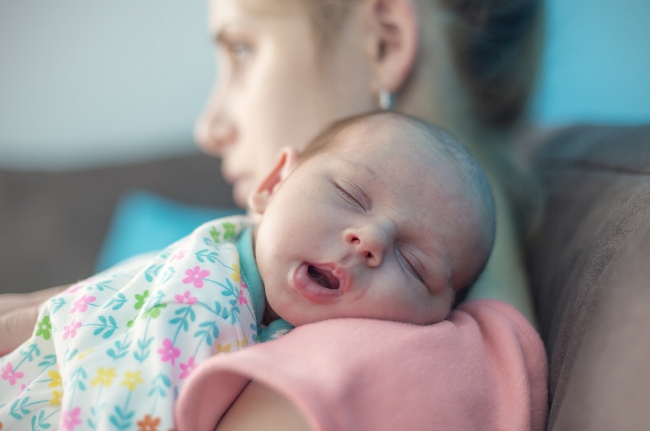You’ve probably heard of postpartum depression, but did you know new moms can also experience postpartum anxiety?
Read on for answers to demystifying postpartum depression and anxiety.
Q: How do I know if I have postpartum depression?
A: Postpartum depression occurs anywhere between a few days after delivery to months after delivery. The condition varies in severity, but certain symptoms can be an indicator that new moms should seek medical attention.
These symptoms include:
- Excessive fatigue
- Feelings of sadness or hopelessness
- Difficulty sleeping
- Loss of appetite
- Loss of interest in activities you previously enjoyed
“Postpartum depression occurs in 1 in 4-5 pregnancies,” said Kristi Angevine, M.D., OB/GYN with UT Erlanger Health System. “If, two weeks after delivery, a woman is experiencing a combination of persistent distress, repetitive crying, feelings of detachment or distance from loved ones, feelings of disconnection with the baby, or intense guilt, anger or fear, she could be experiencing postpartum depression.
“When these feelings are persistent or make a mom feel overwhelmed, she should seek help.”
Q: I’ve heard of postpartum depression, but what exactly is postpartum anxiety?
A: While not quite as common as postpartum depression, postpartum anxiety affects many women and may be experienced alone or along with depression. Women who experience postpartum anxiety may have panic attacks or other symptoms, including:
- Changes in eating and sleeping habits
- Racing thoughts that can’t be contained
- Unceasing worry
- Fear that something bad will happen
- Difficulty focusing and sitting still
- Dizziness, hot flashes and nausea
“Postpartum anxiety is very common,” Dr. Angevine said. “Estimates suggest it occurs in one in 10 women after delivery, and it is characterized by distress stemming from anxious feelings, constant worry and racing thoughts. It can range from intense anxiety and panic to obsessive compulsive thoughts and behaviors.”
Q: Who is most likely to develop postpartum depression or anxiety?
A: Postpartum mood disorders can develop in any woman following delivery. However, some women are at particular risk.
“Certain categories of women are at a higher risk,” Dr. Angevine said. “First-time moms; women with previous anxiety, depression, panic or obsessive mood disturbances; women with negative or unrealistic expectations about motherhood; women with a perceived or real lack of support; women with thyroid dysfunction; and women with recent or elevated stress are all at an increased risk of developing either postpartum depression or anxiety.”
Q: What can I do if I think I have one of these conditions?
A: “Reaching out for help quickly is the best way to get to feeling better,” Dr. Angevine said. “Languishing with depression or anxiety makes it more difficult to recover. Providers know that the conditions are tremendously common, and they want to be a helpful resource.”
A number of treatment options are available for postpartum depression and postpartum anxiety, including therapy and medication.
If you think you or a loved one may be experiencing postpartum depression or anxiety, your physician can help diagnose and provide a treatment plan. Need a doctor? Find one here. If you experience thoughts of hurting yourself or your baby, call 911.







